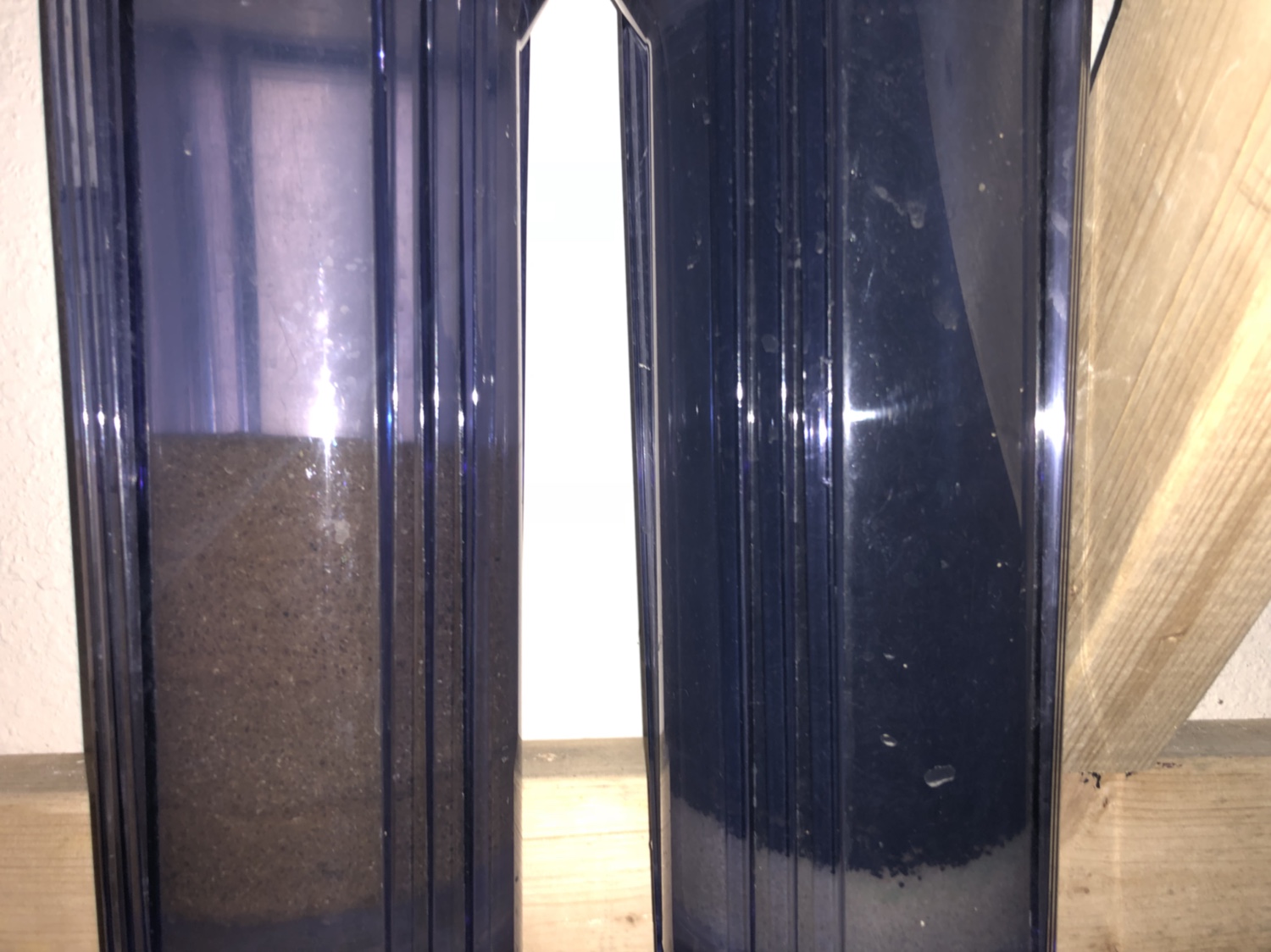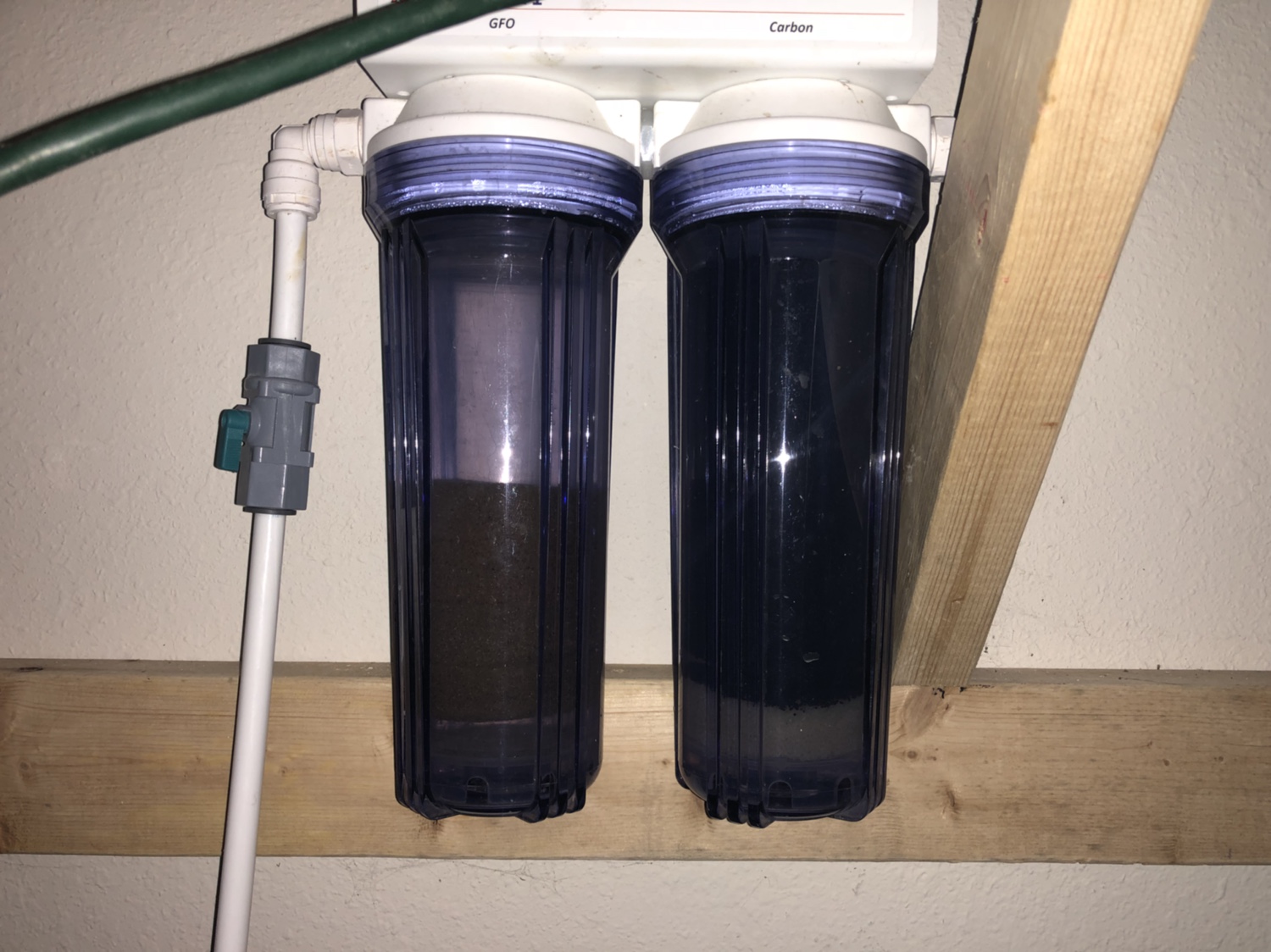Nice set up thanks for sharing

I am all out of filter floss so I made do with sponges.
I just buy a cheap roll of 100% Poly material from Walmart, 5$ lasts 7 months or more. I’ll cut a width about 3/4 as tall as the tractor chamber and roll it up and stuff it in the first chamber.
Navigation
Install the app
How to install the app on iOS
Follow along with the video below to see how to install our site as a web app on your home screen.
Note: This feature may not be available in some browsers.
More options
You are using an out of date browser. It may not display this or other websites correctly.
You should upgrade or use an alternative browser.
You should upgrade or use an alternative browser.
0 nitrate in a sps tank: Good or Bad?
- Thread starter Genicanthus-R-Us
- Start date
- Tagged users None
I run the tanks with pellets and without skimming. I have 0 NO3 (<< 0.05 ppm NO3, no coloration with Tropic Marin NO3 Pro test). Corals have good growth, good coloration and good polyp extension.
I have 0 NO3 but this does not mean I have 0 N-compounds. From the pellets all N is in particulate form which means corals feed on particles flushed out of the pellet reactor. This is sufficient and gives the coral animal the control over the nutrients. The zooxanthellae densisty and the nutrition of the zooxanthellae is regulated by the coral animal.
I run the tanks with 0 NO3 for around 15 years now with stages with some NO3 due to coral feeding in some tanks. I prefer 0 NO3 with pellet filtration. Pellet filtration binds the ammonia excreted by the fish to biomass and inhibits nitrification through competition in this way. For me it is the best way of feeding corals.
Hans, I am intrigued by your use of biopellets without skimming. What do you use for PO4 control in a setup such as this? Do you have any threads where you explain your skimmeless/biopellet technique in more detail? The recycling of inorganic nitrate back into an organic form for coral feeding is interesting. I would imagine that this would require close attention to nutrient inputs to the system to prevent eutrophication? How does such a setup respond to sudden changes, like a fish dying?
Dennis
It seems like you have great balance in your tank. What do you have for fish(mostly small,la rge or a combination?) ThanksI have zero no3 in both systems for 7 years. Full color and growth at a rate of around 1/2- 1 inch a month. Zero po4 also. It’s undetected. I am sure it’s their but not on my test kits. I religiously do 20% water change every 2 weeks. I feed 2x a day in a 125 with 20 fish currently.
I run a tiny amount of GFO at 1/4 cup. Just to keep it balanced.
Zero is where I want to be.
- Joined
- Aug 24, 2016
- Messages
- 1,501
- Reaction score
- 2,295
I would imagine that this would require close attention to nutrient inputs to the system to prevent eutrophication? How does such a setup respond to sudden changes, like a fish dying?
To be honest I do not care much about nutrients. I can´t detect nitrate, I have nutrients in particulate and organic forms, that´s sufficient to me. As long as the corals grow well everythinge is fine. I have not much fish, just a few for nutrients, which I feed well. I do trials with filter feeders which I have to feed also. It are the experimental setups of my employer where I test our products and methods. I am employee of Tropic Marin (actually Dr. Biener GmbH, Tropic Marin is a brand).
I think this kind of system reacts to sudden nutrient imputs similar as a nitrificating filter. With this kind of pellet filtration biomass acts as a buffer for nutrients. If there are more nutrients the degradation of pellets is faster and the input of organic material is higher. With more nutrients also corals grow faster and remove the nutrients. In medium and long term also more sponges and tubeworms grow which also bind nutrients.
To be honest I do not care much about nutrients. I can´t detect nitrate, I have nutrients in particulate and organic forms, that´s sufficient to me. As long as the corals grow well everythinge is fine. I have not much fish, just a few for nutrients, which I feed well. I do trials with filter feeders which I have to feed also. It are the experimental setups of my employer where I test our products and methods. I am employee of Tropic Marin (actually Dr. Biener GmbH, Tropic Marin is a brand).
I think this kind of system reacts to sudden nutrient imputs similar as a nitrificating filter. With this kind of pellet filtration biomass acts as a buffer for nutrients. If there are more nutrients the degradation of pellets is faster and the input of organic material is higher. With more nutrients also corals grow faster and remove the nutrients. In medium and long term also more sponges and tubeworms grow which also bind nutrients.
I am going to have to try this. I have been thinking of something along these lines for awhile, using coral as the consumer and export, with minimal fish load. Rather than the other way around, lots of fish and coral added after the fact. I would never have thought of using biopellets though. That is a variation that dovetails nicely with this way of thinking though.
Dennis
- Joined
- Aug 24, 2016
- Messages
- 1,501
- Reaction score
- 2,295
Dennis, here is some more information. You asked for the fish. We have 6 tanks, four are running this system. Each tank has 750 l /200 gal., each two tanks in a rack are connected. Each tank has one pellet reactor, 1 pair of Dascyllus, 1 pair of Chrysiptera, 1 pair of Sphaeramia and 1 Ctenochaetus. Tanks are illuminated with LEDs. Corals are mainly SPS and LPS, a few zooxanthellate gorgonians, which respond very positive to the pellet filtration also, and 1 small Sinularia per tank.
Mostly small fish. But I have a couple tangs and a large melanarus.It seems like you have great balance in your tank. What do you have for fish(mostly small,la rge or a combination?) Thanks
- Joined
- Mar 2, 2018
- Messages
- 65
- Reaction score
- 74
I've had great success with 5-10ppm nitrates with sps. I used to be ulns, but ever since dosing nitrate and maintaining a 5, things are way Better.
- Joined
- Jul 20, 2016
- Messages
- 348
- Reaction score
- 312
Allowed my nitrates to increase to about 5, in about 3 days my ice fire echinata went from a grayish blue to a bright greenish blue.
Similar threads
- Replies
- 18
- Views
- 1,017
- Replies
- 13
- Views
- 298
New Posts
-
-
Help with skimmer. And help with foam in my sump
- Latest: heelanjeffrey85
-
-















